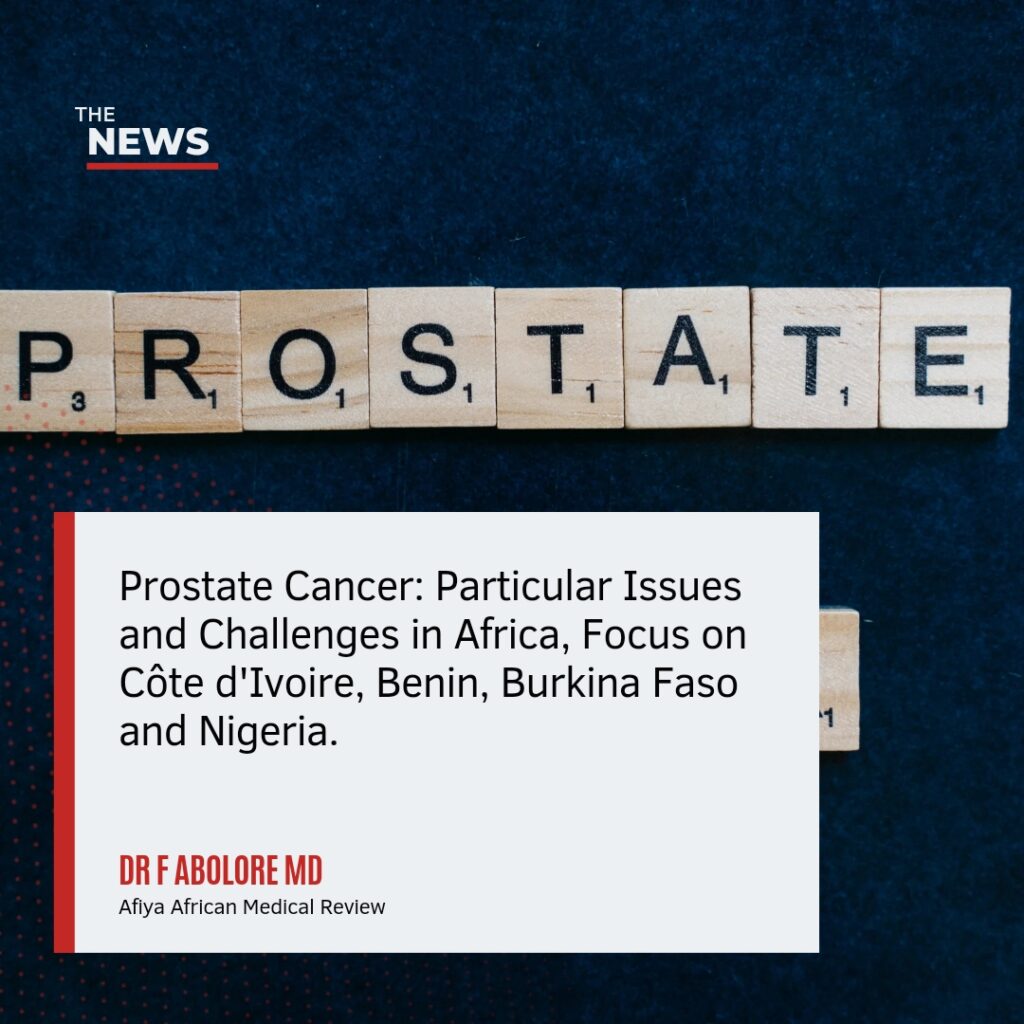Prostate cancer is one of the most common forms of cancer among men worldwide. Primarily affecting men over the age of 50, the disease represents a major public health challenge. This article highlights the global statistics, the specific challenges faced in West Africa, notably in Côte d’Ivoire, Benin, Burkina Faso and Nigeria, and the importance of prevention and screening.
A disease of global proportions
According to the World Health Organization (WHO), prostate cancer is the most frequently diagnosed cancer in men, after liver cancer. In fact, according to Globocan, by 2022 there will be 103,050 new cases in Africa, a frequency of 20.4%, making it the third most common cancer in Africa after breast and cervical cancer in women. Every year, hundreds of thousands of new cases are recorded, with mortality rates varying considerably from one region to another, due to access to care and levels of awareness (WHO, 2021). 55,744 deaths recorded in 2022 according to Globocan made prostate cancer the fourth most deadly cancer in Africa after breast, cervix and liver.
The Burden of Prostate Cancer in West Africa
The situation in West Africa is worrying. By 2022, this disease will account for 30.2% of new cases, i.e. 31,231 new cases, with a mortality rate of 10.8%, i.e. 18,787 deaths. This makes it the second leading cause of death after breast cancer. Men of African origin are at increased risk of developing prostate cancer, often in more aggressive forms than in other populations. This is particularly true in Côte d’Ivoire, Benin, Burkina Faso and Nigeria.
Ivory Coast
In Côte d’Ivoire, prostate cancer is one of the most common cancers in men. In 2022, 4,041 new cases were recorded, with a high mortality rate of 15.7% due to late diagnosis and limited access to specialized care (Globocan 2022, Côte d’Ivoire Ministry of Health, 2022). Although screening and treatment facilities are available in major cities such as Abidjan, they are less accessible in rural areas.
Benin
In Benin, the situation is similar, with around 1,048 cases diagnosed per year, representing an incidence of 30.2%. The disease-related mortality rate is 12%, or 610 deaths (Globocan 2022, Public Health Report, 2022). Challenges include a lack of modern medical equipment and a shortage of trained oncology staff. Awareness campaigns, although on the increase thanks to local NGOs, still require greater support to have a significant impact.
Burkina Faso
Burkina Faso also faces a growing challenge with prostate cancer. In 2022, some 1,152 new cases were diagnosed (Globocan 2022, Burkina Faso Ministry of Health, 2022). Mortality linked to this scourge in Faso is 7%, or 772 recorded deaths. The main difficulties lie in limited access to health infrastructures, particularly in rural areas. The capital, Ouagadougou, is relatively well equipped compared with other regions, but medical resources remain insufficient. Awareness and prevention campaigns still need to be developed to inform men of the early signs and importance of regular screening.
Nigeria
Nigeria, Africa’s most populous country, faces a heavy burden with nearly 18,000 new cases annually (Globocan 2022, Nigerian Cancer Society, 2023). 14.4 mortality rate from the disease, i.e. 11,443 deaths. The majority of diagnoses are made at an advanced stage, complicating treatment and increasing the risk of mortality. Although Lagos and Abuja have advanced infrastructures, access to care is uneven, particularly in rural areas. Awareness-raising initiatives and training programs for healthcare personnel are needed to improve the situation.
Challenges common to all four countries
Challenges encountered in Côte d’Ivoire, Benin, Burkina Faso and Nigeria include:
– Limited access to specialized care: Medical equipment and qualified personnel are often concentrated in capital cities.
– Lack of awareness: Low awareness of prostate cancer leads to late diagnosis.
– Insufficient resources: Insufficient infrastructure and qualified medical staff hamper the fight against cancer.
Current initiatives and solutions
To combat prostate cancer, initiatives have been put in place in the following countries:
– Côte d’Ivoire: Mobile screening campaigns and partnerships with NGOs.
– Benin: Community awareness projects and information campaigns.
– Burkina Faso: Collaboration between the Ministry of Health and international organizations to develop mobile clinics.
– Nigeria: Screening and awareness programs, with initiatives supported by NGOs and public-private partnerships.
It’s important to note that from the age of 50, screening can be carried out by healthcare professionals, including a rectal examination of the prostate, a prostate-specific antigen (PSA) assay, and possibly an ultrasound scan of the gland. In certain special cases, such as the presence of genetic markers like the BRCA gene, it is possible to diagnose the disease before it appears or at an early stage, in order to propose appropriate solutions to patients.
Conclusion
Prostate cancer is a global health issue, but it takes on an even more complex dimension in West Africa. In Côte d’Ivoire, Benin, Burkina Faso and Nigeria, the challenges of inadequate infrastructure, limited awareness and human resources require a coordinated response. Improving prevention, diagnosis and access to care is crucial to reducing mortality and improving the quality of life of men affected by this disease.
Dr F Abolore MD
References
1. Globocan (2022)- World cancer statistics.
2. Ivory Coast Ministry of Health (2022) – National health data.
3. Public Health Report, Benin (2022) – Annual report.
4. Burkina Faso Ministry of Health (2022) – Public health reports.
5. Nigerian Cancer Society (2023) – Report on prostate cancer in Nigeria.
6. W
HO (2021) – Recommendations for prevention and awareness.







OTHER ARTICLES
Editorial — Prevent, inform, and act for women’s health in Africa
Kenya : Government Prioritises Maternal Health and Strengthens Support for Community Health Promoters
Strengthening pandemic prevention, preparedness, and response capacities in Senegal using the “One Health” approach